关于人工智能的英文
- 格式:doc
- 大小:22.50 KB
- 文档页数:5
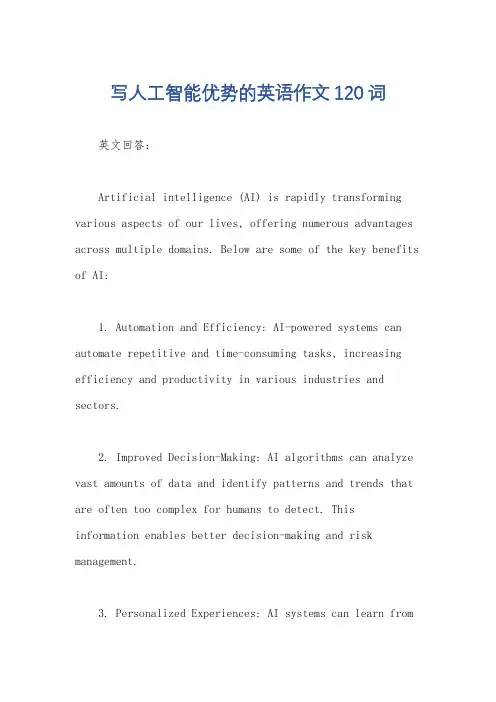
写人工智能优势的英语作文120词英文回答:Artificial intelligence (AI) is rapidly transforming various aspects of our lives, offering numerous advantages across multiple domains. Below are some of the key benefits of AI:1. Automation and Efficiency: AI-powered systems can automate repetitive and time-consuming tasks, increasing efficiency and productivity in various industries and sectors.2. Improved Decision-Making: AI algorithms can analyze vast amounts of data and identify patterns and trends that are often too complex for humans to detect. This information enables better decision-making and risk management.3. Personalized Experiences: AI systems can learn fromindividual preferences and behavior to provide tailored recommendations and services, enhancing user experiences in e-commerce, entertainment, and other domains.4. Enhanced Healthcare: AI is revolutionizinghealthcare by assisting in disease diagnosis, drug discovery, and the development of personalized treatment plans, leading to improved patient outcomes.5. Scientific Discovery: AI algorithms can process and analyze large datasets, uncovering hidden insights and enabling scientific breakthroughs in fields such as physics, chemistry, and biology.6. Transportation and Mobility: AI is optimizing transportation systems through self-driving vehicles,traffic management, and supply chain optimization, reducing congestion and improving efficiency.7. Customer Service and Support: AI-powered chatbotsand virtual assistants provide 24/7 support, answering customer queries and resolving issues promptly andeffectively.8. Financial Analysis and Risk Management: AI algorithms can analyze financial data and market trends to predict risks, identify opportunities, and optimize investment strategies.9. Fraud Detection and Cybersecurity: AI systems can detect anomalies and identify suspicious activities inreal-time, enhancing security and preventing fraud in various sectors.10. Education and Learning: AI is transforming education by providing personalized learning experiences, adaptive assessments, and virtual tutoring, enhancing student engagement and comprehension.中文回答:人工智能的优势。
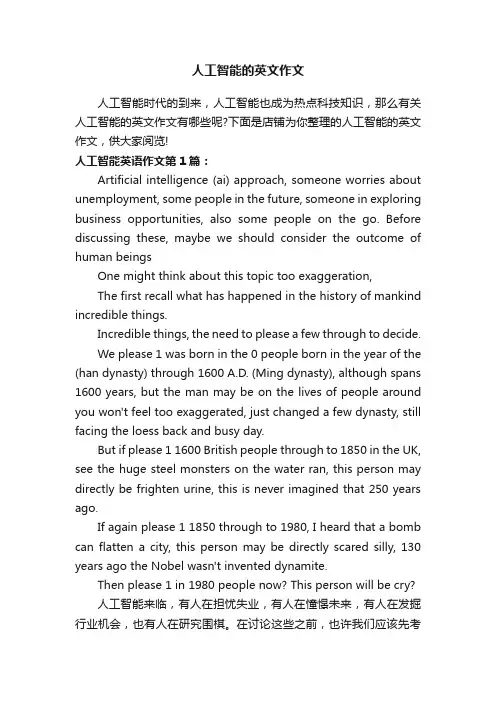
人工智能的英文作文人工智能时代的到来,人工智能也成为热点科技知识,那么有关人工智能的英文作文有哪些呢?下面是店铺为你整理的人工智能的英文作文,供大家阅览!人工智能英语作文第1篇:Artificial intelligence (ai) approach, someone worries about unemployment, some people in the future, someone in exploring business opportunities, also some people on the go. Before discussing these, maybe we should consider the outcome of human beingsOne might think about this topic too exaggeration,The first recall what has happened in the history of mankind incredible things.Incredible things, the need to please a few through to decide.We please 1 was born in the 0 people born in the year of the (han dynasty) through 1600 A.D. (Ming dynasty), although spans 1600 years, but the man may be on the lives of people around you won't feel too exaggerated, just changed a few dynasty, still facing the loess back and busy day.But if please 1 1600 British people through to 1850 in the UK, see the huge steel monsters on the water ran, this person may directly be frighten urine, this is never imagined that 250 years ago.If again please 1 1850 through to 1980, I heard that a bomb can flatten a city, this person may be directly scared silly, 130 years ago the Nobel wasn't invented dynamite.Then please 1 in 1980 people now? This person will be cry?人工智能来临,有人在担忧失业,有人在憧憬未来,有人在发掘行业机会,也有人在研究围棋。
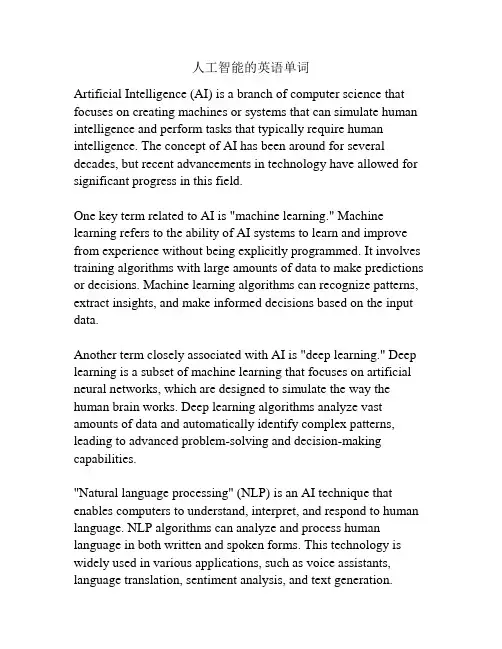
人工智能的英语单词Artificial Intelligence (AI) is a branch of computer science that focuses on creating machines or systems that can simulate human intelligence and perform tasks that typically require human intelligence. The concept of AI has been around for several decades, but recent advancements in technology have allowed for significant progress in this field.One key term related to AI is "machine learning." Machine learning refers to the ability of AI systems to learn and improve from experience without being explicitly programmed. It involves training algorithms with large amounts of data to make predictions or decisions. Machine learning algorithms can recognize patterns, extract insights, and make informed decisions based on the input data.Another term closely associated with AI is "deep learning." Deep learning is a subset of machine learning that focuses on artificial neural networks, which are designed to simulate the way the human brain works. Deep learning algorithms analyze vast amounts of data and automatically identify complex patterns, leading to advanced problem-solving and decision-making capabilities."Natural language processing" (NLP) is an AI technique that enables computers to understand, interpret, and respond to human language. NLP algorithms can analyze and process human language in both written and spoken forms. This technology is widely used in various applications, such as voice assistants, language translation, sentiment analysis, and text generation."Computer vision" is another important aspect of AI that focuses on enabling machines to understand and interpret visual data. Computer vision algorithms analyze images and videos to extract information and identify patterns. This technology is used in various fields, including facial recognition, object detection, autonomous vehicles, and quality control in manufacturing."Robotics" is an interdisciplinary field that combines AI with engineering and mechanical systems to create machines that can physically interact with the environment. AI-powered robots can perform complex tasks, such as assembly line operations, surgical procedures, and exploration in hazardous environments. Robotics has the potential to revolutionize industries and improve efficiency and safety."Expert systems" are AI programs designed to provide specialized knowledge and expertise in a specific domain. These systems use rule-based reasoning and knowledge representation techniques to solve complex problems. Expert systems are widely used in fields such as medicine, finance, and engineering to assist professionals in decision-making and problem-solving."Autonomous systems" refer to AI-powered machines or vehicles that can operate and make decisions independently, without human intervention. Autonomous systems include self-driving cars, drones, and robotic spacecraft. These systems rely on AI algorithms to process sensory data, navigate, and perform tasks without human control.In conclusion, AI encompasses various terms and concepts that contribute to the development of intelligent machines. These include machine learning, deep learning, natural language processing, computer vision, robotics, expert systems, and autonomous systems. AI has the potential to revolutionize numerous industries and has already made significant impacts in areas such as healthcare, transportation, manufacturing, and communication.。
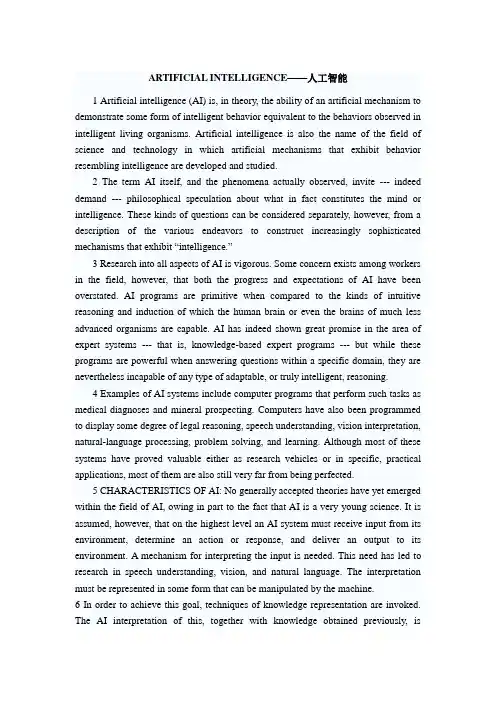
ARTIFICIAL INTELLIGENCE——人工智能1 Artificial intelligence (AI) is, in theory, the ability of an artificial mechanism to demonstrate some form of intelligent behavior equivalent to the behaviors observed in intelligent living organisms. Artificial intelligence is also the name of the field of science and technology in which artificial mechanisms that exhibit behavior resembling intelligence are developed and studied.2 The term AI itself, and the phenomena actually observed, invite --- indeed demand --- philosophical speculation about what in fact constitutes the mind or intelligence. These kinds of questions can be considered separately, however, from a description of the various endeavors to construct increasingly sophisticated mechanisms that exhibit “intelligence.”3 Research into all aspects of AI is vigorous. Some concern exists among workers in the field, however, that both the progress and expectations of AI have been overstated. AI programs are primitive when compared to the kinds of intuitive reasoning and induction of which the human brain or even the brains of much less advanced organisms are capable. AI has indeed shown great promise in the area of expert systems --- that is, knowledge-based expert programs --- but while these programs are powerful when answering questions within a specific domain, they are nevertheless incapable of any type of adaptable, or truly intelligent, reasoning.4 Examples of AI systems include computer programs that perform such tasks as medical diagnoses and mineral prospecting. Computers have also been programmed to display some degree of legal reasoning, speech understanding, vision interpretation, natural-language processing, problem solving, and learning. Although most of these systems have proved valuable either as research vehicles or in specific, practical applications, most of them are also still very far from being perfected.5 CHARACTERISTICS OF AI: No generally accepted theories have yet emerged within the field of AI, owing in part to the fact that AI is a very young science. It is assumed, however, that on the highest level an AI system must receive input from its environment, determine an action or response, and deliver an output to its environment. A mechanism for interpreting the input is needed. This need has led to research in speech understanding, vision, and natural language. The interpretation must be represented in some form that can be manipulated by the machine.6 In order to achieve this goal, techniques of knowledge representation are invoked. The AI interpretation of this, together with knowledge obtained previously, ismanipulated within the system under study by means of some mechanism or algorithm. The system thus arrives at an internal representation of the response or action. The development of such processes requires techniques of expert reasoning, common-sense reasoning, problem solving, planning, signal interpretation, and learning. Finally, the system must网construct an effective response. This requires techniques of natural-language generation.7 THE FIFTH-GENERATION ATTEMPT: In the 1980s, in an attempt to develop an expert system on a very large scale, the Japanese government began building powerful computers with hardware that made logical inferences in the computer language PROLOG. (Following the idea of representing knowledge declaratively, the logic programming PROLOG had been developed in England and France. PROLOG is actually an inference engine that searches declared facts and rules to confirm or deny a hypothesis. A drawback of PROLOG is that it cannot be altered by the programmer.) The Japanese referred to such machines as “fifth-generation” computers.8 By the early 1990s, however, Japan had forsaken this plan and even announced that they were ready to release its software. Although they did not detail reasons for their abandonment of the fifth-generation program, U.S scientists faulted their efforts at AI as being too much in the direction of computer-type logic and too little in the direction of human thinking processes. The choice of PROLOG was also criticized. Other nations were by then not developing software in that computer language and were showing little further enthusiasm for it. Furthermore, the Japanese were not making much progress in parallel processing, a kind of computer architecture involving many independent processors working together in parallel—a method increasingly important in the field of computer science. The Japanese have now defined a “sixth-generation” goal instead, called the Real World Computing Project, that veers away from the expert-systems approach that works only by built-in logical rules.9 THE FUTURE OF AI RESEARCH: One impediment to building even more useful expert systems has been, from the start, the problem of input---in particular, the feeding of raw data into an AI system. To this end, much effort has been devoted to speech recognition, character recognition, machine vision, and natural-language processing. A second problem is in obtaining knowledge. It has proved arduous toextract knowledge from an expert and then code it for use by the machine, so a great deal of effort is also being devoted to learning and knowledge acquisition.10 One of the most useful ideas that has emerged from AI research, however, is that facts and rules (declarative knowledge) can be represented separately from decision-making algorithms (procedural knowledge). This realization has had a profound effect both on the way that scientists approach problems and on the engineering techniques used to produce AI systems. By adopting a particular procedural element, called an inference engine, development of an AI system is reduced to obtaining and codifying sufficient rules and facts from the problem domain. This codification process is called knowledge engineering. Reducing system development to knowledge engineering has opened the door to non-AI practitioners. In addition, business and industry have been recruiting AI scientists to build expert systems.11 In particular, a large number of these problems in the AI field have been associated with robotics. There are, first of all, the mechanical problems of getting a machine to make very precise or delicate movements. Beyond that are the much more difficult problems of programming sequences of movements that will enable a robot to interact effectively with a natural environment, rather than some carefully designed laboratory setting. Much work in this area involves problem solving and planning.12 A radical approach to such problems has been to abandon the aim of developing “reasoning” AI systems and to produce, instead, robots that function “reflexively”. A leading figure in this field has been Rodney Brooks of the Massachusetts Institute of Technology. These AI researchers felt that preceding efforts in robotics were doomed to failure because the systems produced could not function in the real world. Rather than trying to construct integrated networks that operate under a centralizing control and maintain a logically consistent model of the world, they are pursuing a behavior-based approach named subsumption architecture.13 Subsumption architecture employs a design technique called “layering,”---a form of parallel processing in which each layer is a separate behavior-producing network that functions on its own, with no central control. No true separation exists, in these layers, between data and computation. Both of them are distributed over the same networks. Connections between sensors and actuators in these systems are kept short as well. The resulting robots might be called “mindless,” but in fact they have demonstrated remarkable abilities to learn and to adapt to real-life circumstances.14 The apparent successes of this new approach have not convinced many supporters of integrated-systems development that the alternative is a valid one for drawing nearer to the goal of producing true AI. The arguments that have arisen between practitioners of the two different methodologies are in fact profound ones. They have implications about the nature of intelligence in general, whether natural or artificial。

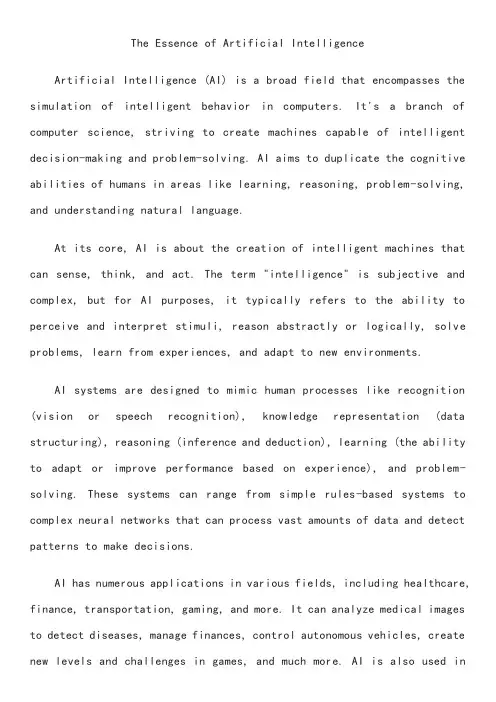
The Essence of Artificial IntelligenceArtificial Intelligence (AI) is a broad field that encompasses the simulation of intelligent behavior in computers. It's a branch of computer science, striving to create machines capable of intelligent decision-making and problem-solving. AI aims to duplicate the cognitive abilities of humans in areas like learning, reasoning, problem-solving, and understanding natural language.At its core, AI is about the creation of intelligent machines that can sense, think, and act. The term "intelligence" is subjective and complex, but for AI purposes, it typically refers to the ability to perceive and interpret stimuli, reason abstractly or logically, solve problems, learn from experiences, and adapt to new environments.AI systems are designed to mimic human processes like recognition (vision or speech recognition), knowledge representation (data structuring), reasoning (inference and deduction), learning (the ability to adapt or improve performance based on experience), and problem-solving. These systems can range from simple rules-based systems to complex neural networks that can process vast amounts of data and detect patterns to make decisions.AI has numerous applications in various fields, including healthcare, finance, transportation, gaming, and more. It can analyze medical images to detect diseases, manage finances, control autonomous vehicles, create new levels and challenges in games, and much more. AI is also used invoice assistants like Siri or Alexa, which can understand and respond to natural language.AI is continuously evolving as technology progresses. Current research is exploring new techniques like transfer learning and deep learning to create more robust AI systems that can handle increasingly complex tasks. As AI matures, we can expect even more profound impacts on society and the world around us.。
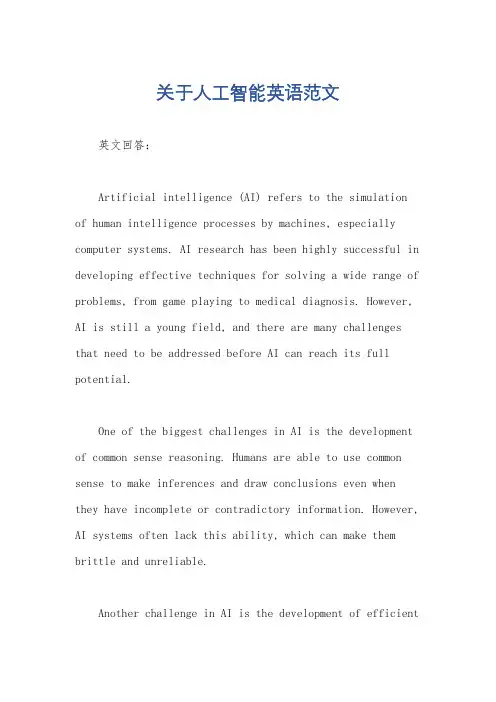
关于人工智能英语范文英文回答:Artificial intelligence (AI) refers to the simulation of human intelligence processes by machines, especially computer systems. AI research has been highly successful in developing effective techniques for solving a wide range of problems, from game playing to medical diagnosis. However, AI is still a young field, and there are many challenges that need to be addressed before AI can reach its full potential.One of the biggest challenges in AI is the development of common sense reasoning. Humans are able to use common sense to make inferences and draw conclusions even when they have incomplete or contradictory information. However, AI systems often lack this ability, which can make them brittle and unreliable.Another challenge in AI is the development of efficientlearning algorithms. AI systems need to be able to learn from data in order to improve their performance. However, many learning algorithms are computationally expensive, which can make them impractical for use in real-world applications.Despite these challenges, AI has the potential to revolutionize many aspects of our lives. AI systems are already being used to improve healthcare, transportation, manufacturing, and finance. As AI continues to develop, it is likely to have an even greater impact on our world.Here are some specific examples of how AI is being used today:Healthcare: AI systems are being used to develop new drugs, diagnose diseases, and provide personalized treatment plans. For example, AI-powered systems have been shown to be able to detect cancer cells with the same accuracy as human pathologists.Transportation: AI systems are being used to developself-driving cars, optimize traffic flow, and manage logistics. For example, AI-powered systems are being used to develop self-driving cars that can safely navigate complex traffic conditions.Manufacturing: AI systems are being used to improve production efficiency, quality control, and maintenance. For example, AI-powered systems are being used to develop robots that can work alongside human workers to assemble products.Finance: AI systems are being used to detect fraud, analyze financial data, and make investment decisions. For example, AI-powered systems are being used to develop algorithms that can identify fraudulent transactions with high accuracy.AI is a rapidly developing field with the potential to revolutionize many aspects of our lives. However, there are still many challenges that need to be addressed before AI can reach its full potential.中文回答:人工智能(AI)是指由机器,尤其是计算机系统模拟人类智能过程的能力。
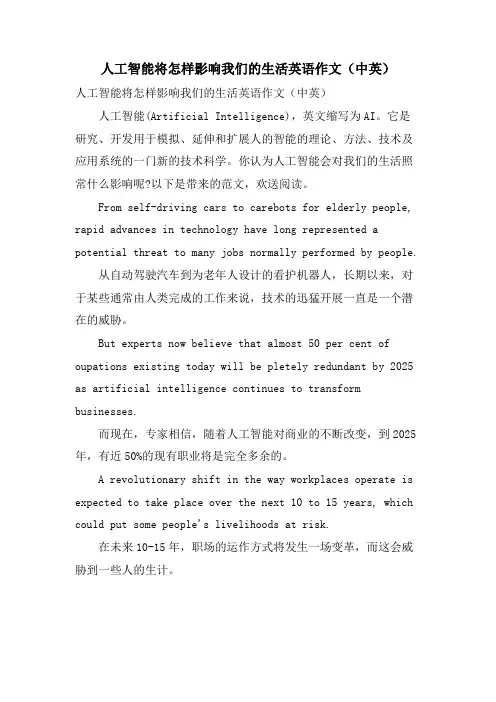
人工智能将怎样影响我们的生活英语作文(中英)人工智能将怎样影响我们的生活英语作文(中英)人工智能(Artificial Intelligence),英文缩写为AI。
它是研究、开发用于模拟、延伸和扩展人的智能的理论、方法、技术及应用系统的一门新的技术科学。
你认为人工智能会对我们的生活照常什么影响呢?以下是带来的范文,欢送阅读。
From self-driving cars to carebots for elderly people, rapid advances in technology have long represented a potential threat to many jobs normally performed by people.从自动驾驶汽车到为老年人设计的看护机器人,长期以来,对于某些通常由人类完成的工作来说,技术的迅猛开展一直是一个潜在的威胁。
But experts now believe that almost 50 per cent of oupations existing today will be pletely redundant by 2025 as artificial intelligence continues to transform businesses.而现在,专家相信,随着人工智能对商业的不断改变,到2025年,有近50%的现有职业将是完全多余的。
A revolutionary shift in the way workplaces operate is expected to take place over the next 10 to 15 years, which could put some people's livelihoods at risk.在未来10-15年,职场的运作方式将发生一场变革,而这会威胁到一些人的生计。
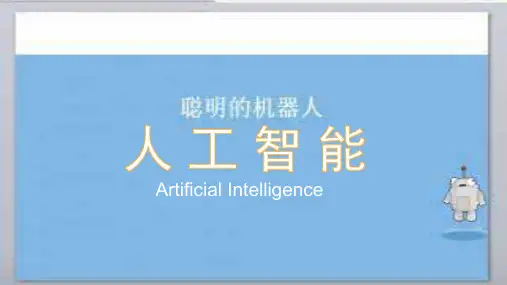
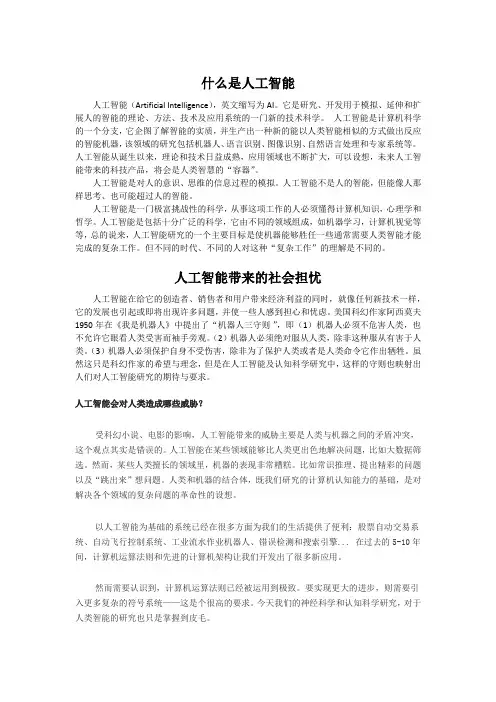
什么是人工智能人工智能(Artificial Intelligence),英文缩写为AI。
它是研究、开发用于模拟、延伸和扩展人的智能的理论、方法、技术及应用系统的一门新的技术科学。
人工智能是计算机科学的一个分支,它企图了解智能的实质,并生产出一种新的能以人类智能相似的方式做出反应的智能机器,该领域的研究包括机器人、语言识别、图像识别、自然语言处理和专家系统等。
人工智能从诞生以来,理论和技术日益成熟,应用领域也不断扩大,可以设想,未来人工智能带来的科技产品,将会是人类智慧的“容器”。
人工智能是对人的意识、思维的信息过程的模拟。
人工智能不是人的智能,但能像人那样思考、也可能超过人的智能。
人工智能是一门极富挑战性的科学,从事这项工作的人必须懂得计算机知识,心理学和哲学。
人工智能是包括十分广泛的科学,它由不同的领域组成,如机器学习,计算机视觉等等,总的说来,人工智能研究的一个主要目标是使机器能够胜任一些通常需要人类智能才能完成的复杂工作。
但不同的时代、不同的人对这种“复杂工作”的理解是不同的。
人工智能带来的社会担忧人工智能在给它的创造者、销售者和用户带来经济利益的同时,就像任何新技术一样,它的发展也引起或即将出现许多问题,并使一些人感到担心和忧虑。
美国科幻作家阿西莫夫1950年在《我是机器人》中提出了“机器人三守则”,即(1)机器人必须不危害人类,也不允许它眼看人类受害而袖手旁观。
(2)机器人必须绝对服从人类,除非这种服从有害于人类。
(3)机器人必须保护自身不受伤害,除非为了保护人类或者是人类命令它作出牺牲。
虽然这只是科幻作家的希望与理念,但是在人工智能及认知科学研究中,这样的守则也映射出人们对人工智能研究的期待与要求。
人工智能会对人类造成哪些威胁?受科幻小说、电影的影响,人工智能带来的威胁主要是人类与机器之间的矛盾冲突,这个观点其实是错误的。
人工智能在某些领域能够比人类更出色地解决问题,比如大数据筛选。

人工智能发展的英语作文英文回答:The Evolution of Artificial Intelligence.Artificial intelligence (AI) has evolved rapidly in recent years, becoming increasingly sophisticated and capable of performing a wide range of tasks. This rapid development has been driven by advances in hardware, algorithms, and data availability.One of the most significant advances in AI has been the development of deep learning, a type of machine learning that allows AI systems to learn from large amounts of data without being explicitly programmed. Deep learning has enabled AI systems to achieve state-of-the-art performance on a variety of tasks, including image recognition, natural language processing, and speech recognition.Another important advance in AI has been thedevelopment of cloud computing, which provides AI systems with access to vast amounts of computational resources. This has enabled AI systems to train on larger datasets and to perform more complex tasks.The combination of deep learning and cloud computing has led to a number of breakthroughs in AI, including the development of self-driving cars, facial recognition systems, and medical diagnosis systems. AI is also being used to improve efficiency and productivity in a wide range of industries, from manufacturing to healthcare.As AI continues to evolve, it is likely to have a profound impact on our lives. AI systems will become more capable and versatile, and they will be used to solve a wider range of problems. This will lead to newopportunities and challenges, and it is important to be prepared for the future of AI.中文回答:人工智能的发展。
人工智能开创未来的英语范文英文回答:Artificial intelligence (AI) is rapidly transformingthe world in unprecedented ways. From powering self-driving cars to diagnosing diseases, AI is revolutionizingindustries and creating new possibilities. As AI continuesto advance, it is poised to play a pivotal role in shaping the future of humanity.One of the most significant ways AI will impact the future is by automating tasks and processes. This will free up human workers to focus on more creative and strategic endeavors, leading to increased productivity and innovation. Additionally, AI-powered systems can analyze vast amountsof data to identify patterns and make predictions, whichcan be invaluable for decision-making in various fields.AI is also expected to transform the healthcare industry. AI-powered algorithms can assist in diagnosingdiseases, predicting patient outcomes, and developing personalized treatment plans. Moreover, AI-enabled robots can perform surgeries with greater precision and accuracy, leading to improved patient outcomes and reduced recovery times.Education is another area where AI is expected to make a significant impact. AI-powered tutors can provide personalized learning experiences tailored to eachstudent's needs, helping them to learn more effectively and efficiently. Additionally, AI can be used to grade assignments and provide feedback, freeing up teachers to focus on providing support and guidance to their students.AI is also poised to revolutionize the transportation sector. Self-driving cars and trucks are already being tested on roads around the world, and they promise to make transportation safer, more efficient, and more accessible. AI-powered traffic management systems can also help to reduce congestion and improve air quality in urban areas.In the manufacturing sector, AI is expected to driveincreased automation and productivity. AI-powered robots can perform complex tasks with speed and precision, freeing up human workers to focus on higher-level tasks. Additionally, AI can be used to optimize production processes and identify areas for improvement, leading to increased efficiency and cost savings.As AI continues to advance, it is important to consider its potential implications for society. One concern is that AI could lead to job displacement as machines become capable of performing tasks that are currently done by humans. However, AI is also expected to create new jobs in fields such as AI development, data analysis, and robotics. It is important to ensure that workers are adequately trained and supported to transition to these new roles.Another concern is that AI could be used for malicious purposes, such as developing autonomous weapons or spreading misinformation. It is important to establish ethical guidelines and regulations to ensure that AI is used for the benefit of humanity and not for harm.Overall, AI has the potential to transform the future of humanity in profound ways. By automating tasks, improving efficiency, and providing new insights, AI can help us to solve some of the world's most pressing challenges. However, it is important to approach the development and deployment of AI with foresight and ethical considerations to ensure that its benefits are realized while mitigating its potential risks.中文回答:人工智能开创未来。
人工智能的英语作文英文回答:Artificial intelligence (AI) is a rapidly growing field that has the potential to revolutionize the way we live and work. At its core, AI refers to the ability of machines to perform tasks that would normally require humanintelligence, such as recognizing speech, making decisions, and even learning from experience.One of the most exciting applications of AI is in the area of automation. By using AI-powered robots and machines, we can automate many of the repetitive and mundane tasksthat humans currently perform, freeing us up to focus on more creative and fulfilling work. This has the potentialto increase productivity and efficiency in a wide range of industries, from manufacturing to healthcare.Another important application of AI is in the field of data analysis. With the vast amounts of data that are nowavailable, it can be difficult for humans to make sense of it all. However, AI algorithms can quickly and accurately analyze large datasets, identifying patterns and trendsthat would be difficult or impossible for humans to detect. This has important implications for fields such as healthcare, where AI can be used to identify potential health risks and develop personalized treatment plans.Despite the many benefits of AI, there are also concerns about its impact on society. One of the biggest concerns is the potential for AI to replace human workers, leading to widespread unemployment. There are also concerns about the ethical implications of AI, such as the potential for bias in decision-making algorithms and the risk of AI being used for malicious purposes.Overall, AI has the potential to transform our world in countless ways. However, it is important that we approach this technology with caution and carefully consider its potential impact on society.中文回答:人工智能(AI)是一个快速发展的领域,有可能彻底改变我们的生活和工作方式。
人工智能ai英文介绍Artificial Intelligence (AI): An IntroductionIn the era of rapid technological advancements, artificial intelligence (AI) stands as one of the most exciting and transformative fields. AI refers to the simulation of human intelligence in machines that are programmed to think and learn, enabling them to perform tasks typically requiring human cognition. This article serves as an introduction to AI, discussing its definition, applications, and potential impact on various industries.1. Definition of Artificial IntelligenceAI is a branch of computer science that focuses on creating intelligent machines capable of mimicking human behavior. It involves developing algorithms and models that enable computers to process information, reason, learn, and make decisions. The ultimate goal of AI is to build machines that not only perform tasks but also possess a level of intelligence similar to or surpassing human intelligence.2. History of Artificial IntelligenceThe concept of AI emerged in the 1950s when researchers began exploring the idea of creating machines that can imitate human thinking. The field progressed through various stages, from early rule-based systems to modern machine learning algorithms. Significant milestones in AI history include the development of expert systems, neural networks, and the recent breakthroughs in deep learning.3. Types of Artificial IntelligenceAI can be categorized into two main types: Narrow AI and General AI. Narrow AI, also known as Weak AI, refers to AI systems designed for specific tasks, such as voice assistants or autonomous vehicles. General AI, on the other hand, represents a hypothetical form of AI that possesses the ability to understand, learn, and perform any intellectual task that a human being can do.4. Applications of Artificial IntelligenceAI has found applications across various industries and domains. In healthcare, AI is utilized for medical diagnosis, drug discovery, and personalized treatment plans. In finance, AI is used for algorithmic trading, fraud detection, and risk assessment. Other sectors benefiting from AI include transportation, manufacturing, customer service, and agriculture.5. Impact of Artificial Intelligence on SocietyThe widespread adoption of AI brings both opportunities and challenges. On one hand, AI has the potential to enhance productivity, automate mundane tasks, and improve decision-making. On the other hand, concerns arise regarding job displacement, ethical implications, and biases in AI systems. Striking a balance between technological progress and societal well-being is a crucial consideration for the future of AI.6. Future Trends in Artificial IntelligenceThe future of AI holds immense potential for advancements. Some emerging trends include the integration of AI with other technologies like Internet of Things (IoT) and robotics, the development of explainable AI for transparency, and the focus on ethical AI design. Continued research anddevelopment will drive further innovation and push the boundaries of what AI can achieve.In conclusion, artificial intelligence is a fascinating field that revolutionizes how machines interact and respond to tasks, rivalling human intelligence. This article provided an overview of AI, discussing its definition, history, types, applications, societal impact, and future trends. As AI continues to evolve, it is essential to ensure its ethical and responsible adoption in order to harness its full potential for the benefit of society.。
人工智能优点英文作文英文回答:Artificial intelligence (AI) has emerged as a transformative technology with the potential to revolutionize various aspects of human life. Here are some of the key advantages of AI:1. Efficiency and Productivity: AI algorithms can automate repetitive and time-consuming tasks, freeing up human workers to focus on more complex and creative endeavors. This increased efficiency leads to enhanced productivity and cost savings for businesses.2. Enhanced Decision-Making: AI systems can analyze vast amounts of data and identify patterns and correlations that humans might miss. This enables businesses to make data-driven decisions, reduce risks, and improve outcomes.3. Personalization and Customization: AI algorithms cantailor products, services, and experiences to individual preferences. This personalization enhances customer satisfaction and loyalty while driving sales and revenue.4. Improved Healthcare: AI applications in healthcare can assist in disease diagnosis, drug discovery, and personalized treatment plans. It empowers healthcare professionals with powerful tools to improve patient outcomes and reduce healthcare costs.5. Advancements in Scientific Research: AI algorithms can accelerate scientific research by analyzing large datasets, simulating experiments, and identifying new hypotheses. This contributes to breakthroughs and discoveries in fields such as medicine, physics, and climate science.6. Improved Transportation: AI technologies optimize traffic flow, automate driving, and enhance safety in transportation systems. This reduces congestion, improves efficiency, and promotes sustainability.7. Enhanced Security: AI systems can detect and respond to cyber threats, protect sensitive data, and improve physical security. This strengthens defenses against malicious actors and ensures the privacy and safety of individuals and organizations.8. Language Translation: AI algorithms enable real-time language translation, breaking down language barriers and fostering global communication and collaboration.9. Accessibility: AI-powered assistive technologies empower individuals with disabilities by providing access to information, communication, and mobility. This enhances their quality of life and promotes inclusivity.10. Innovation: AI fuels innovation by providing new tools and capabilities for researchers, engineers, and entrepreneurs. It accelerates the pace of technological advancement and fosters the development of groundbreaking products and services.中文回答:人工智能的优点:1. 效率和生产力,人工智能算法可以自动化重复且耗时的任务,从而解放人力,让他们专注于更复杂和创造性的工作。
人工智能的英语作文英文回答:Artificial intelligence, or AI, is a rapidly growingfield that has the potential to revolutionize the way welive and work. It refers to the development of computer systems that can perform tasks that typically require human intelligence, such as visual perception, speech recognition, decision-making, and language translation. AI has already made significant advancements in various industries, including healthcare, finance, transportation, and entertainment.One of the most well-known examples of AI is virtual personal assistants, such as Apple's Siri, Amazon's Alexa, and Google's Assistant. These virtual assistants use AI algorithms to understand and respond to user commands, making our lives more convenient and efficient. For example, I use Siri on my iPhone to set reminders, send messages,and get directions while driving. It's like having apersonal assistant in my pocket!Another example of AI that has become increasingly prevalent is recommendation systems used by online platforms like Netflix, Amazon, and Spotify. These systems analyze users' past behaviors and preferences to suggest personalized content, such as movies, products, or music. For instance, when I log into Netflix, I often see recommendations for movies and TV shows that align with my interests, thanks to the AI algorithms working behind the scenes.In addition to consumer-facing applications, AI is also being used in more complex and critical tasks, such as medical diagnosis and treatment planning. For instance, researchers are developing AI systems that can analyze medical images, such as MRIs and CT scans, to assist doctors in detecting and diagnosing diseases. This not only speeds up the diagnostic process but also improves the accuracy of diagnoses, ultimately benefiting patients.Despite the many benefits of AI, there are alsoconcerns about its potential impact on the job market and privacy. Some people worry that AI will replace human workers in certain industries, leading to unemployment and economic disruption. Moreover, the collection and analysis of massive amounts of personal data by AI systems raise concerns about privacy and data security. These issues highlight the need for ethical guidelines and regulations to ensure that AI is used responsibly and for the benefit of society.In conclusion, artificial intelligence is a powerful and transformative technology with the potential to improve our lives in countless ways. From virtual assistants to recommendation systems to medical diagnostics, AI is already making a significant impact on various aspects of our daily lives. However, it is essential to address the ethical and societal implications of AI to ensure that it is used in a responsible and beneficial manner.中文回答:人工智能,或者AI,是一个快速发展的领域,有潜力彻底改变我们的生活和工作方式。
关于人工智能的英文随着科学技术近年来突飞猛进的发展,计算机及相关智能化应用在各个领域中占据了越来越重要的地位下面是为你整理的关于人工智能的英文,供大家阅览!人工智能英文版作文篇一don’t rely too much on computersnowadays, a large number of people are becoming increasingly dependent on their pc. they might use such computer software as qq or fetion to stay in touch with their family and friends. they may surf the internet to find useful information for them or to help their work done. anyway, reasons for relying on computers are uncountable.however, relying excessively on computers can bring about lots of problems. first and for most, computers can make people lazy. computers are faster than human in calculation, more capable in getting things done all at one time. once a person has such an assistant, he or she can be addicted to getting helped. thus, when they run into problems, instead of thinking by themselves and trying their best to figure things out, the lazy version of them may just turn tocomputer for convenience.in my opinion, we should strike a balance between asking for help from computers and working on our own. nevertheless, computers are only tools devised by human who should not be taken place by them. only in keeping our minds active and brains trained can we human invent smarter devices than computer and build a better world of intelligence.人工智能英文版作文篇二how will ai affect our life?with the development of economy and science and technology, ai plays a more and more important role in our life.three months ago,alphago became famous.five one hundred million people watching "man-machine war", in the end it depends on the technical advantage of big data and deep learning in a 4-1 winners’ posture tells people, to ai is no longer just the scene in the movie, but in the real world.ai has become a hot topic for a while,some people welcome the progress and expect ai to benefit mankind in more fields,on the contrary, some others fear that ai will eventually get out of control.in this regard, my view is that ai will bring us morebenefits.for example, it is fashionable for youngsters to purchase daily essentialson some famous websites, liketaobao, ebay and alibaba, through many courier companies.in addition, tesla, google and general motorsdevelopeddriverless cars. what’s more,in the future, the robot will rescue people from dangerous work and so on.i believe that ai will make our life more beautiful.人工智能英文版作文篇三nowadays, artificial intelligence, which is becoming more and more familiar with us with the development of science and technology, is infiltrating into our daily life gradually, and it brings great convenience and progress to our society. although we don't have a great knowledge about the specific content of artificial intelligence, we enjoy the convenience and benefit that artificial intelligence brings to us. we can say that artificial intelligence is changing the way of our living, learning, working and so on.artificial intelligence can be ed as a new science and technology, which is used to simulate human intelligence. namely, computers simulate the way of human's thinking and intelligent behavior, such as learning, reasoning, thinking, planning, and so on. we can't deny the fact that artificial intelligence is of great application nowadays. for example, alot ofintelligent computer or household appliances come into our life, intelligent robots help us to finish some difficult work that we can't do by ourselves, and intelligent control has improved our working greatly. we can say that artificial intelligence exists everywhere.as one of the three most cutting-edge technologies in twenty-first century, artificial intelligence has a very bright prospect. however, the biggest obstacle of it is that it is a subject, which is related to computer science. psychology. philosophy and other knowledge. therefore, what we should do is to study hard, widen our knowledge, and consolidate our professional knowledge. only by this way can we do contribution to the development of artificial intelligence and the improvement of our lives. future trends in computer science is one of the artificial intelligence,it is the research and artificial simulation of human thought and eventually be able to make a human like to think the same machine.for human services and to help people solve problems. after all, people thought it was unique, there are feelings, there are a variety of character, this will be very difficult to achieve in the machine.in fact, to do the same as the human thinking machine, the only one of the artificial intelligence, is by no means all. throughthe study of artificial intelligence, can resolve all kinds of scientific problems, and promote the development of other science, the artificial intelligence is the best!i believe that the science of artificial intelligence is waiting for humanity to explore it step by step the real connotation.。